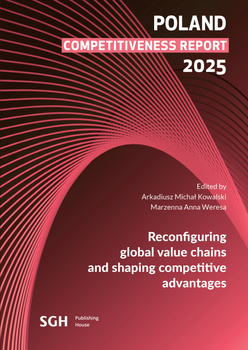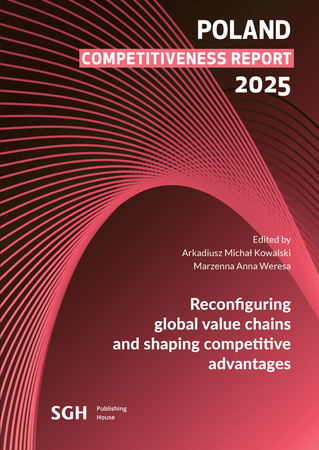
[[[separator]]]
The concept of competitiveness is currently experiencing a renaissance in economic, political and social analyses [Draghi, 2024; Letta, 2024; Richardson et al., 2024]. The contemporary approach emphasises the multidimensionality of this concept but also points to numerous limitations in its interpretation. In the traditional view, productivity was considered as a key element of competitiveness [Porter, 1990, 2008],
reflected in the growth of gross domestic product and other economic and financial indicators. Further research introduced a broader social and environmental context into the discourse [Aiginger, Vogel, 2015], which evolves by adapting to changing conditions and new global challenges such as climate change, the gradual decline in biodiversity, the pandemic and its effects, the energy crisis, economic and social
inequalities, armed conflicts, etc. In light of these changes, it is proposed to redefine the concept of competitiveness towards a systemic perception linked with ensuring environmental and social sustainability, which means striving to maximise social value while rationally using limited natural resources and minimising the environmental and social costs of this usage [Richardson et al., 2024]. The question of the future of Europe’s competitiveness is being explored [Draghi, 2024]. Setting priorities for shaping competitiveness in the European Union has significant economic policy implications, especially in light of the crises that have affected the world in the past five years (including COVID-19, geopolitical tensions, and the energy crisis). Threats have emerged due to increasing integration with global value chains (GVCs). The
disruption of supply chains, as well as difficulties in accessing raw materials or markets, have highlighted the need to increase resilience to external shocks and diversify the geographical structure of international trade and investment links [EIB, 2024]. This monograph contributes to the ongoing discussion on the competitiveness of an open economy in the context of increasing integration within GVCs. Taking into
account the global and European context, the authors of the monograph aim to assess the competitiveness of the Polish economy and its changes during the period 2015– 2023 in comparison with other EU member states, in relation to Poland’s position in global and European value chains. Marzenna Anna Weresa, Arkadiusz M 10 ichał Kowalski This monograph consists of two parts divided into chapters. The first part is a diagnosis of the current competitive position of the Polish economy, while the second part analyses the ability to compete in international markets. The starting point are theoretical remarks on the evolution of the concept of competitiveness in the context of increasing linkages within GVCs, which is discussed in Chapter 1, while Chapters 2–4 outline Poland’s competitive position in GVCs compared to other EU countries. A detailed analysis has been conducted on foreign direct investments and Poland’s international competitiveness in the context of foreign trade. Chapters 5 and 6, which provide additional insights into Poland’s competitive position, focus on the traditional perspective of competitiveness, emphasising income convergence and factor productivity. The chapters included in Part II of the monograph explore the competitive capacity of the Polish economy in the framework of its participation in GVCs. The analysis starts with investigating the impact of GVCs on labour market transformations in Poland (Chapter 7) and innovation (Chapter 8). In turn, Chapter 9 contains an analysis of the main directions of Poland’s policy regarding participation in global value chains. Chapter 10 discusses the legal conditions of Poland’s participation in GVCs. The monograph concludes with a summary presenting the key findings from the conducted research, both in relation to the emerging theory of competitiveness and economic practice. In the summary, recommendations for economic policy are
outlined, aimed at reshaping Poland’s role in GVCs and enhancing its focus on high value-added operations. The recommendations also concern ways to support Poland’s pro-competitive development and achieve goals beyond traditionally understood economic growth.
[[[separator]]]
List of Abbreviations
Preface
Marzenna Anna Weresa, Arkadiusz Michał Kowalski
Part I. The Competitive Position of Poland in the European Union: The Importance of Global Value Chains
Chapter 1. Global Value Chains and Competitiveness – A Theoretical Approach
Marzenna Anna Weresa, Arkadiusz Michał Kowalski
Chapter 2. Evolution of Poland’s Position in Global Value Chains
Andżelika Kuźnar
Chapter 3. The Impact of Foreign Direct Investment on Poland’s Participation in Global Value Chains
Tomasz Marcin Napiórkowski
Chapter 4. Poland’s Competitiveness in Foreign Trade
Artur Franciszek Tomeczek
Chapter 5. Income Convergence: Poland in the European Union – The Pentagon of Competitiveness
Mariusz Próchniak
Chapter 6. Changes of Total Factor Productivity
Mariusz Próchniak
Part II. Competitive Ability in Foreign Market
Chapter 7. The Labour Market in Poland and Global Production Networks Participation .
Anna Maria Dzienis
Chapter 8. Global Value Chains and Poland’s Innovativeness – The Macro-,Meso- And Microeconomic Perspective
Arkadiusz Michał Kowalski, Małgorzata Stefania Lewandowska, Marzenna Anna Weresa
Chapter 9. Towards a Change in Poland’s Place in Global Value Chains
Eliza Przeździecka
Chapter 10. Legal Aspects of Poland’s Participation in Global Value Chains
Jerzy Menkes
Conclusions and Recommendations
Marzenna Anna Weresa, Arkadiusz Michał Kowalski
Opis
Wstęp
The concept of competitiveness is currently experiencing a renaissance in economic, political and social analyses [Draghi, 2024; Letta, 2024; Richardson et al., 2024]. The contemporary approach emphasises the multidimensionality of this concept but also points to numerous limitations in its interpretation. In the traditional view, productivity was considered as a key element of competitiveness [Porter, 1990, 2008],
reflected in the growth of gross domestic product and other economic and financial indicators. Further research introduced a broader social and environmental context into the discourse [Aiginger, Vogel, 2015], which evolves by adapting to changing conditions and new global challenges such as climate change, the gradual decline in biodiversity, the pandemic and its effects, the energy crisis, economic and social
inequalities, armed conflicts, etc. In light of these changes, it is proposed to redefine the concept of competitiveness towards a systemic perception linked with ensuring environmental and social sustainability, which means striving to maximise social value while rationally using limited natural resources and minimising the environmental and social costs of this usage [Richardson et al., 2024]. The question of the future of Europe’s competitiveness is being explored [Draghi, 2024]. Setting priorities for shaping competitiveness in the European Union has significant economic policy implications, especially in light of the crises that have affected the world in the past five years (including COVID-19, geopolitical tensions, and the energy crisis). Threats have emerged due to increasing integration with global value chains (GVCs). The
disruption of supply chains, as well as difficulties in accessing raw materials or markets, have highlighted the need to increase resilience to external shocks and diversify the geographical structure of international trade and investment links [EIB, 2024]. This monograph contributes to the ongoing discussion on the competitiveness of an open economy in the context of increasing integration within GVCs. Taking into
account the global and European context, the authors of the monograph aim to assess the competitiveness of the Polish economy and its changes during the period 2015– 2023 in comparison with other EU member states, in relation to Poland’s position in global and European value chains. Marzenna Anna Weresa, Arkadiusz M 10 ichał Kowalski This monograph consists of two parts divided into chapters. The first part is a diagnosis of the current competitive position of the Polish economy, while the second part analyses the ability to compete in international markets. The starting point are theoretical remarks on the evolution of the concept of competitiveness in the context of increasing linkages within GVCs, which is discussed in Chapter 1, while Chapters 2–4 outline Poland’s competitive position in GVCs compared to other EU countries. A detailed analysis has been conducted on foreign direct investments and Poland’s international competitiveness in the context of foreign trade. Chapters 5 and 6, which provide additional insights into Poland’s competitive position, focus on the traditional perspective of competitiveness, emphasising income convergence and factor productivity. The chapters included in Part II of the monograph explore the competitive capacity of the Polish economy in the framework of its participation in GVCs. The analysis starts with investigating the impact of GVCs on labour market transformations in Poland (Chapter 7) and innovation (Chapter 8). In turn, Chapter 9 contains an analysis of the main directions of Poland’s policy regarding participation in global value chains. Chapter 10 discusses the legal conditions of Poland’s participation in GVCs. The monograph concludes with a summary presenting the key findings from the conducted research, both in relation to the emerging theory of competitiveness and economic practice. In the summary, recommendations for economic policy are
outlined, aimed at reshaping Poland’s role in GVCs and enhancing its focus on high value-added operations. The recommendations also concern ways to support Poland’s pro-competitive development and achieve goals beyond traditionally understood economic growth.
Spis treści
List of Abbreviations
Preface
Marzenna Anna Weresa, Arkadiusz Michał Kowalski
Part I. The Competitive Position of Poland in the European Union: The Importance of Global Value Chains
Chapter 1. Global Value Chains and Competitiveness – A Theoretical Approach
Marzenna Anna Weresa, Arkadiusz Michał Kowalski
Chapter 2. Evolution of Poland’s Position in Global Value Chains
Andżelika Kuźnar
Chapter 3. The Impact of Foreign Direct Investment on Poland’s Participation in Global Value Chains
Tomasz Marcin Napiórkowski
Chapter 4. Poland’s Competitiveness in Foreign Trade
Artur Franciszek Tomeczek
Chapter 5. Income Convergence: Poland in the European Union – The Pentagon of Competitiveness
Mariusz Próchniak
Chapter 6. Changes of Total Factor Productivity
Mariusz Próchniak
Part II. Competitive Ability in Foreign Market
Chapter 7. The Labour Market in Poland and Global Production Networks Participation .
Anna Maria Dzienis
Chapter 8. Global Value Chains and Poland’s Innovativeness – The Macro-,Meso- And Microeconomic Perspective
Arkadiusz Michał Kowalski, Małgorzata Stefania Lewandowska, Marzenna Anna Weresa
Chapter 9. Towards a Change in Poland’s Place in Global Value Chains
Eliza Przeździecka
Chapter 10. Legal Aspects of Poland’s Participation in Global Value Chains
Jerzy Menkes
Conclusions and Recommendations
Marzenna Anna Weresa, Arkadiusz Michał Kowalski
Opinie
The concept of competitiveness is currently experiencing a renaissance in economic, political and social analyses [Draghi, 2024; Letta, 2024; Richardson et al., 2024]. The contemporary approach emphasises the multidimensionality of this concept but also points to numerous limitations in its interpretation. In the traditional view, productivity was considered as a key element of competitiveness [Porter, 1990, 2008],
reflected in the growth of gross domestic product and other economic and financial indicators. Further research introduced a broader social and environmental context into the discourse [Aiginger, Vogel, 2015], which evolves by adapting to changing conditions and new global challenges such as climate change, the gradual decline in biodiversity, the pandemic and its effects, the energy crisis, economic and social
inequalities, armed conflicts, etc. In light of these changes, it is proposed to redefine the concept of competitiveness towards a systemic perception linked with ensuring environmental and social sustainability, which means striving to maximise social value while rationally using limited natural resources and minimising the environmental and social costs of this usage [Richardson et al., 2024]. The question of the future of Europe’s competitiveness is being explored [Draghi, 2024]. Setting priorities for shaping competitiveness in the European Union has significant economic policy implications, especially in light of the crises that have affected the world in the past five years (including COVID-19, geopolitical tensions, and the energy crisis). Threats have emerged due to increasing integration with global value chains (GVCs). The
disruption of supply chains, as well as difficulties in accessing raw materials or markets, have highlighted the need to increase resilience to external shocks and diversify the geographical structure of international trade and investment links [EIB, 2024]. This monograph contributes to the ongoing discussion on the competitiveness of an open economy in the context of increasing integration within GVCs. Taking into
account the global and European context, the authors of the monograph aim to assess the competitiveness of the Polish economy and its changes during the period 2015– 2023 in comparison with other EU member states, in relation to Poland’s position in global and European value chains. Marzenna Anna Weresa, Arkadiusz M 10 ichał Kowalski This monograph consists of two parts divided into chapters. The first part is a diagnosis of the current competitive position of the Polish economy, while the second part analyses the ability to compete in international markets. The starting point are theoretical remarks on the evolution of the concept of competitiveness in the context of increasing linkages within GVCs, which is discussed in Chapter 1, while Chapters 2–4 outline Poland’s competitive position in GVCs compared to other EU countries. A detailed analysis has been conducted on foreign direct investments and Poland’s international competitiveness in the context of foreign trade. Chapters 5 and 6, which provide additional insights into Poland’s competitive position, focus on the traditional perspective of competitiveness, emphasising income convergence and factor productivity. The chapters included in Part II of the monograph explore the competitive capacity of the Polish economy in the framework of its participation in GVCs. The analysis starts with investigating the impact of GVCs on labour market transformations in Poland (Chapter 7) and innovation (Chapter 8). In turn, Chapter 9 contains an analysis of the main directions of Poland’s policy regarding participation in global value chains. Chapter 10 discusses the legal conditions of Poland’s participation in GVCs. The monograph concludes with a summary presenting the key findings from the conducted research, both in relation to the emerging theory of competitiveness and economic practice. In the summary, recommendations for economic policy are
outlined, aimed at reshaping Poland’s role in GVCs and enhancing its focus on high value-added operations. The recommendations also concern ways to support Poland’s pro-competitive development and achieve goals beyond traditionally understood economic growth.
List of Abbreviations
Preface
Marzenna Anna Weresa, Arkadiusz Michał Kowalski
Part I. The Competitive Position of Poland in the European Union: The Importance of Global Value Chains
Chapter 1. Global Value Chains and Competitiveness – A Theoretical Approach
Marzenna Anna Weresa, Arkadiusz Michał Kowalski
Chapter 2. Evolution of Poland’s Position in Global Value Chains
Andżelika Kuźnar
Chapter 3. The Impact of Foreign Direct Investment on Poland’s Participation in Global Value Chains
Tomasz Marcin Napiórkowski
Chapter 4. Poland’s Competitiveness in Foreign Trade
Artur Franciszek Tomeczek
Chapter 5. Income Convergence: Poland in the European Union – The Pentagon of Competitiveness
Mariusz Próchniak
Chapter 6. Changes of Total Factor Productivity
Mariusz Próchniak
Part II. Competitive Ability in Foreign Market
Chapter 7. The Labour Market in Poland and Global Production Networks Participation .
Anna Maria Dzienis
Chapter 8. Global Value Chains and Poland’s Innovativeness – The Macro-,Meso- And Microeconomic Perspective
Arkadiusz Michał Kowalski, Małgorzata Stefania Lewandowska, Marzenna Anna Weresa
Chapter 9. Towards a Change in Poland’s Place in Global Value Chains
Eliza Przeździecka
Chapter 10. Legal Aspects of Poland’s Participation in Global Value Chains
Jerzy Menkes
Conclusions and Recommendations
Marzenna Anna Weresa, Arkadiusz Michał Kowalski

